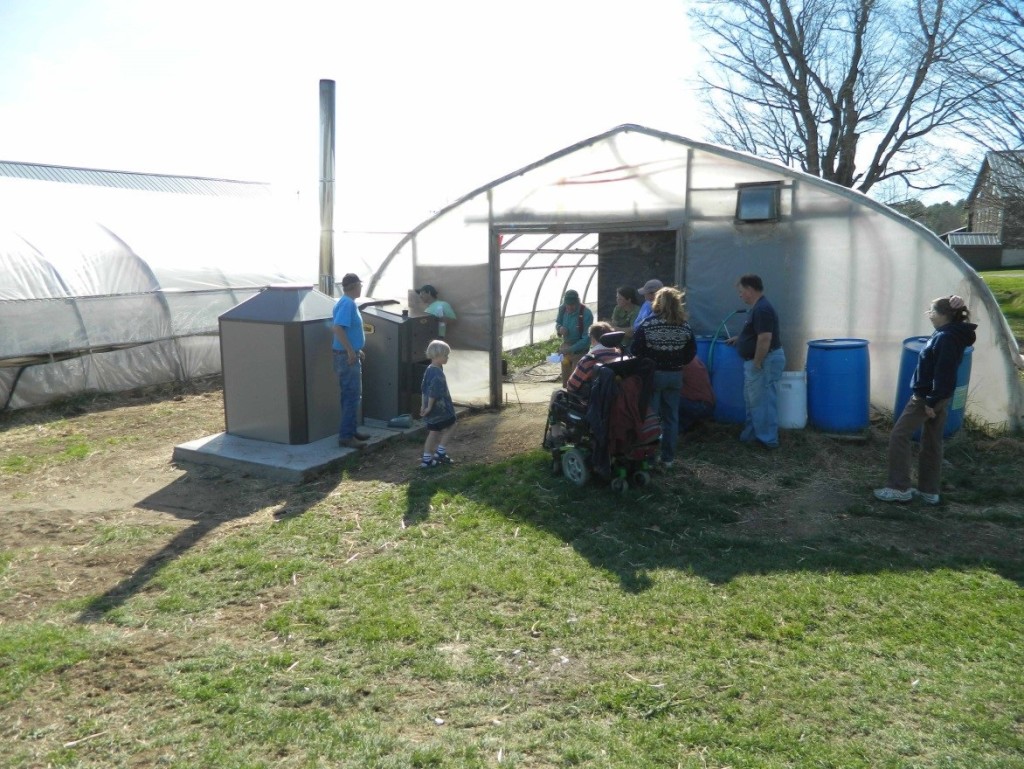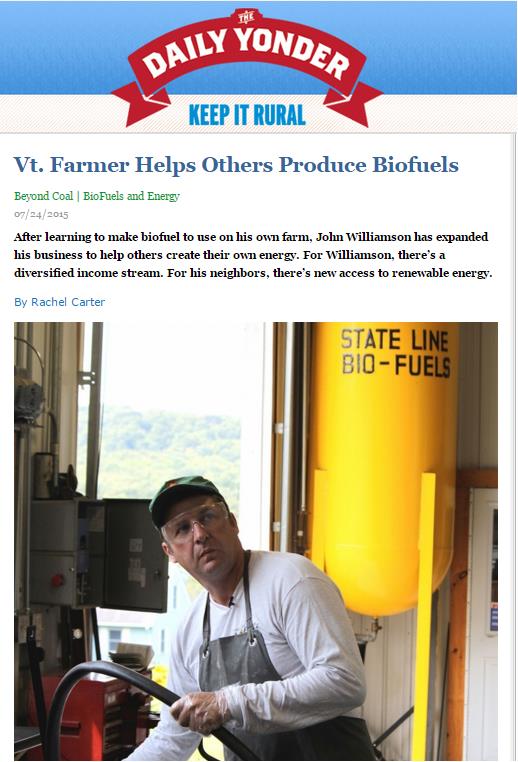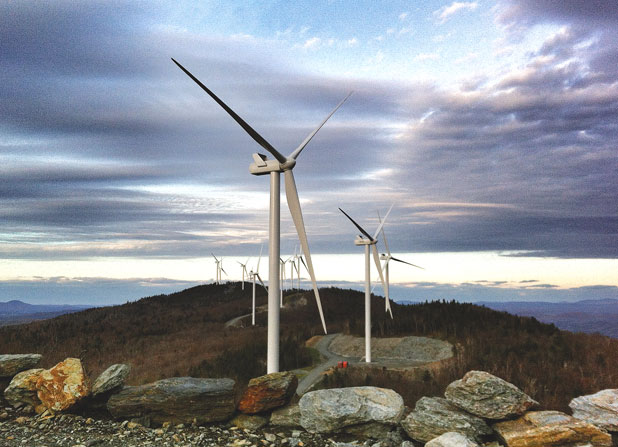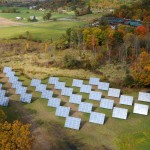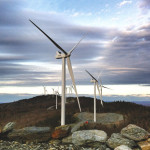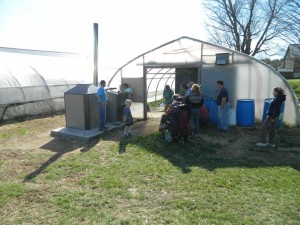 David Marchant and Jane Sorensen of River Berry Farm—an organic vegetable and fruit producer in Fairfax—were early adopters of biomass heating when they installed a corn and pellet furnace in one of their greenhouses in 2008. The furnace required manual lighting and was snuffed out often when strong winds blew, and did not produce reasonable heat. “I kept thinking, there has got to be a better option,” recalls David, “It was a real labor burden, and you couldn’t count on it.”
David Marchant and Jane Sorensen of River Berry Farm—an organic vegetable and fruit producer in Fairfax—were early adopters of biomass heating when they installed a corn and pellet furnace in one of their greenhouses in 2008. The furnace required manual lighting and was snuffed out often when strong winds blew, and did not produce reasonable heat. “I kept thinking, there has got to be a better option,” recalls David, “It was a real labor burden, and you couldn’t count on it.”
Based on their early experiences and bolstered by a commitment to long-term sustainability and reduced fossil fuel dependence, River Berry Farm opted to host a biomass heating demonstration project. This time, they opted for a higher-rated boiler rather than a furnace. Boilers produce hot water, rather than hot air, which allows more options for distributing the heat. The new system also had an automated propane ignition system.
The biomass heating demonstration was part of a UVM Extension project aimed at trialing several furnaces in agricultural heating applications with funding support provided by the High Meadows Fund. According to Chris Callahan, Ag Engineer with UVM Extension Agricultural Engineering Program who assisted with some of the design and performance assessment, “The main lessons learned from these early installations were to buy high quality fuel, seek improved automatic ignition controls, invest in a good chimney and install it well, and know the actual heat output rating of the unit.”
Modern biomass heating appliances generally include a fuel storage bin, an auger for feeding fuel to the appliance, the appliance itself (boiler or furnace) with an ignition system, a combustion chamber, a heat exchanger, and a heat distribution system. They also incorporate some means of controlling combustion, fuel feed rate, and air flow and often include emissions control measures and automated ash removal.
The selected boiler was a Central Boiler Maxim 250 with a 250,000 BTU/hr input rating, efficiency of 87.8%, and EPA Phase II Hydronic Heater qualification. “The boiler makes hot water which we can use in multiple greenhouses by plumbing it to them in insulated PEX piping. Once in the greenhouse, we convert to hot air with a hot water fan coil, put it in the ground for root-zone heating or on the benches in our mat-heating system for starts,” says Marchant. “I like it. I keep trying to find something wrong with it, but I can’t. The payback period is a bit longer due to higher initial costs, but you have to expect that.”
The basic system cost was approximately $13,000 for the boiler, bin, pad, and plumbing to a hot water fan coil. The other heat distribution systems included in-ground PEX, heat exchange, and plumbing for a bench heat system and added approximately another $5,000. The system is more automated and reliable than the earlier furnace was, but the higher initial costs and the fact that the system is only used 3 months out of the year do prolong the payback period to about 12 years when compared with a propane furnace. If the system was used for 6 (space heating) or even 12 months (wash water, pasteurization) of the year the payback would be halved or quartered, respectively.
“In addition to the financial payback, the carbon emissions avoidance is also of interest to many people,” says Callahan, “In River Berry Farm’s case, the Maxim is helping them avoid 5,910 pounds of net CO2 emissions per year which is about equivalent to 5,000 miles car travel or the CO2 sequestered by half an acre of pine forest.”
Learn more about UVM Extension’s Agricultural Engineering Program at.
This story was originally released in a series of energy case studies showcasing farms, businesses, vendors, installers, and technical assistance providers who have made a difference with energy efficiency savings and renewable energy production—all of which are components for helping Vermont reach the renewable energy and environmental impact goals of the Farm to Plate Strategic Plan. Learn more at www.vtfarmtoplate.com.
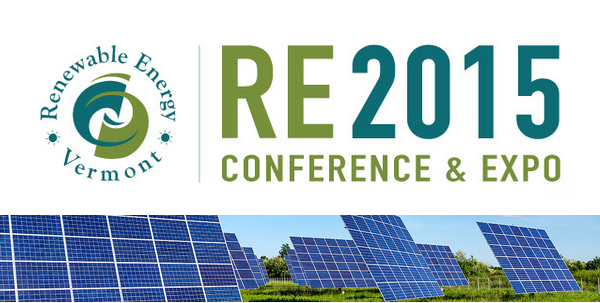 Renewable energy businesses, technology leaders, energy generators, utilities and environmental organizations along with policy makers and communities will convene in Burlington this month to identify tangible strategies for converting the state’s fossil fueled economy to one driven by renewable sources. Renewable Energy 2015 (RE 2015) is Vermont’s premier event exploring the transition to a clean energy economy. The 15th annual business conference, hosted by Renewable Energy Vermont (REV) is slated for October 8 and 9 at the Sheraton Hotel and Conference Center in Burlington, VT.
Renewable energy businesses, technology leaders, energy generators, utilities and environmental organizations along with policy makers and communities will convene in Burlington this month to identify tangible strategies for converting the state’s fossil fueled economy to one driven by renewable sources. Renewable Energy 2015 (RE 2015) is Vermont’s premier event exploring the transition to a clean energy economy. The 15th annual business conference, hosted by Renewable Energy Vermont (REV) is slated for October 8 and 9 at the Sheraton Hotel and Conference Center in Burlington, VT.
With expert speakers on a diverse array of topics, this dynamic forum will look at the opportunities and hurdles involved in moving toward an integrated energy infrastructure addressing power, heating and transportation needs. The conference spans two days and features over 25 conference sessions with more than 65 speakers from throughout the region.
Topics covered include: wind, solar, bioenergy technologies, transportation, resilient grid technology, energy efficiency and energy storage solutions. Conference sessions will look at hurdles to implementing renewables as well as untapped opportunities, technological innovations and tools for financing renewable energy.
To learn more about the 2015 Renewable Energy Conference & Expo’s agenda, exhibitors, and sponsors you can visit the conference website as well as follow the hashtag #RE2015 and Renewable Energy Vermont’s Twitter handle @RE_Vermont for updates!
About Renewable Energy Vermont (REV)
REV is Vermont’s only non-profit, non-partisan renewable energy trade association working to reduce our dependence on fossil fuels and expanding the availability of renewable sources of energy throughout the state and region.
14 Sep 2015
Vermont Farmer Helps Others Produce Biofuel
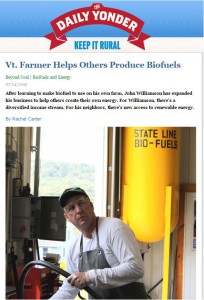 The Vermont Bioenergy Initiative, a program of the Vermont Sustainable Jobs Fund, aims to foster the sustainable bioenergy through a local production for local use model, proven to work for Vermont. Since 2003 the program has allowed Vermont farms to ease their resilience on inconsistently priced, foreign fossil fuels and other agricultural inputs. This is accomplished by focusing on biodiesel production and distribution for heating and transportation, oil crops for on-farm biodiesel and feed, grass energy for heating, and algae production for biofuels and waste management.
The Vermont Bioenergy Initiative, a program of the Vermont Sustainable Jobs Fund, aims to foster the sustainable bioenergy through a local production for local use model, proven to work for Vermont. Since 2003 the program has allowed Vermont farms to ease their resilience on inconsistently priced, foreign fossil fuels and other agricultural inputs. This is accomplished by focusing on biodiesel production and distribution for heating and transportation, oil crops for on-farm biodiesel and feed, grass energy for heating, and algae production for biofuels and waste management.
Vermont Bioenergy Initiative grantees have shown just how much the addition of biomass feedstock can contribute to sustainable agriculture. As one of these grantees, John Williamson of Stateline Farm would put it, “100 years ago everyone produced their own fuel; we are just doing that now in a different way.” This is really a novel way to look of what he is doing on his North Bennington farm. John was featured in a recent story in Daily Yonder which outlined his work and how he has begun helping his Vermont neighbors find their path to this form of sustainable, renewable energy.
For more about John Williamson’s on-farm biodiesel production, watch this video of John in self-designed Biobarn. He and Chris Callahan of University of Vermont Extension show us how they can grow oil crops, make biodiesel, feed animals, and save money!
Also, explore the initiative’s extensive and accessible set of bioenergy resources for replication in rural communities across the United States and beyond.
07 Sep 2015
Weekly Energy Action Seminars at UVM
Beginning Monday the 14th of September, and reoccurring each week thereafter, an Energy Action Seminar Series aims to explore energy transitions in Vermont, the United States and the rest of the World. Sponsored by the University of Vermont’s Clean Energy Fund, Community Development & Applied Economic program, and the Environmental Program this series will be held from 4:00-05:20 pm in Lafayette Hall Room 108* at the University of Vermont. This series featuring world-class speakers on policy options, political controversy, costs and benefits, activism, and jobs is free and open to the public.
While there is already an extensive line-up of speakers, the most high profile speaker to stand out on the list is former Vice President Al Gore. Gore will draw on his years of climate advocacy for his discourse entitled “The Climate Crisis and The Case for Hope.” When delivering this discourse, Gore aims to address three big questions on the climate crisis: Do we need to change? Can we? And will we? The resounding answer to first two questions of course is a loud YES, but third one most likely cannot be answered in certain terms, and hopefully this where Gore can leave us all with “a case for hope.” NOTE: There is a slight deviation of schedule; this seminar will be on Tuesday, October 6th at 10:15 AM in Ira Allen Chapel.
In addition to Al Gore, numerous other leaders from near and afar will attend and speak during the duration of this series. One such visitor on September 21st, Professor Miranda Schreurs of Free University of Berlin and Director of their Environmental Policy Cente,r stands to bring a plethora of insight from her experience in Germany’s renewable energy revolution. In her time with the Environmental Policy Research Center, Professor Schreurs was on the frontlines of the interdisciplinary collaboration of university researchers necessary for Germany to meet it’s ambitious goal of running almost their entire economy on renewable energy by the year 2050. Germany’s goal is very similar to Vermont’s 2050 goal, and the potential for collaboration and to learn from one another through this event are boundless.
Another great guest speaker will come from Washington, all the way across the US,. Yoram Bauman, more commonly known “Stand-Up Economist,” uses a unique combination of witty comedic talent along with his PhD in Environmental Economics to help an audience explore climate change in an economic context. Yoram’s seminar exploring carbon taxing on October 10th will fall just a couple of days after he serves as the keynote speaker and sits on a carbon pricing panel at the 15th Annual Renewable Energy Conference & Expo in Burlignton, VT. His fresh and recent insight into Vermont’s existing carbon pricing discussion mixed with his existing expertise, and sense of humor will make this event worth not missing.
Additionally, many Vermont energy leaders will be speaking at theses weekly seminars including Representative Tony Klein Chair of House Energy and Natural Resources, Asa Hopkins Director of Planning for the Department of Public Service, Gabrielle Stebbins Director of Renewable Energy Vermont, and Mary Powell of Green Mountain Power. Each of these speakers, as well as the entities they represent, have proven themselves leaders in the Vermont energy landscape through their involvement in recent energy legislation, advocacy, and innovation.
| 9/14 | Energy Transitions | Jennie Stephens, Blittersdorf Professor of Sustainability Science & Policy, University of Vermont |
| 9/21 | Going Green: The German Energy Transition | Miranda Schreurs, Professor, Free University of Berlin Director, Environmental Policy Center |
| 9/28 | The Vermont Energy Transition | Tony Klein, Chair: House Energy and Natural Resources, Asa Hopkins, Director of Planning, Department of Public Service. Gabrielle Stebbins, Director, Renewable Energy Vermont |
| 10/5 | Student Alumni: Making a Difference in the World | Panel: Recent UVM grads in energy-related fields |
| 10/6* | The Climate Crisis and The Case for Hope | Al Gore, former Vice-President, United States |
| 10/12 | Carbon Taxes: Why We Need Them | Yoram Bauman, The world’s only “stand-up” Economist |
| 10/19 | Challenging the Car: Creating places where biking is safe & easy | Steve Clark, League of American Bicyclists, Community Organizer |
| 10/26 | Vermont’s Energy Company of the Future: A Customer Driven Energy Transformation | Mary Powell, President & CEO, Green Mountain Power |
| 11/2 | “The War on Coal:” Big Fossils’ Response to Divestment | Jen Schneider, Political Science Dept. Boise State University |
| 11/9 | The Transportation Transition: Complete Streets | Roger Millar, Director, SmartGrowth America |
| 11/16 | Energy Transitions in the Developing world: South Africa Settlements | Steve McCauley, Worcester Polytechnic Institute |
| 11/30 | Design Matters: Building Green | Rolf Keilman, Partner, Truex-Cullins, Vermont |
* Al Gore presentation is in the Ira Allen Chapel, special time, 10:15 a.m. Oct. 6
For more information contact
Fred Hall fhall@uvm.edu
Roison Low rlow@uvm.edu
Richard Watts rwatts@uvm.edu




